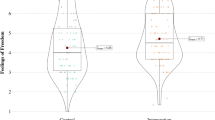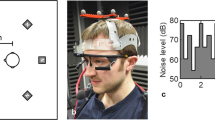Abstract
If a conversation is to proceed smoothly, the participants have to take turns to speak. Studies of conversation have shown that there are signals which speakers give to inform listeners that they are willing to hand over the conversational turn1–4. Some of these signals are part of the text (for example, completion of syntactic segments), some are non-verbal (such as completion of a gesture), but most are carried by the pitch, timing and intensity pattern of the speech; for example, both pitch and loudness tend to drop particularly low at the end of a speaker's turn. When one speaker interrupts another, the two can be said to be disputing who has the turn. Interruptions can occur because one participant tries to dominate or disrupt the conversation. But it could also be the case that mistakes occur in the way these subtle turn-yielding signals are transmitted and received. We demonstrate here that many interruptions in an interview with Mrs Margaret Thatcher, the British Prime Minister, occur at points where independent judges agree that her turn appears to have finished. It is suggested that she is unconsciously displaying turn-yielding cues at certain inappropriate points. The turn-yielding cues responsible are identified.
This is a preview of subscription content, access via your institution
Access options
Subscribe to this journal
Receive 51 print issues and online access
$199.00 per year
only $3.90 per issue
Buy this article
- Purchase on Springer Link
- Instant access to full article PDF
Prices may be subject to local taxes which are calculated during checkout
Similar content being viewed by others
References
Beattie, G. W. Semiotica 34, 55–70 (1981).
Duncan, S. J. Personality soc. Psychol. 23, 283–292 (1972).
Duncan, S. & Fiske, D. W. Face-to-Face Interaction: Research, Methods and Theory (Erlbaum, New Jersey, 1977).
Sacks, H., Schegloff, E. A. & Jefferson, G. A. Language 50, 697–735 (1974).
Beattie, G. W. Semiotica 39, 93–114 (1982).
Beattie, G. W. & Speakman, L. Linguistics (in the press).
Beattie, G. W. Br. J. soc. clin. Psychol. 17, 7–16 (1978).
Beattie, G. W. Br. J. soc. clin. Psychol. 18, 391–392 (1979).
Kendon, A. Acta psychol, 26, 22–63 (1967).
Argyle, M. & Kendon, A. Adv. exp. soc. Psychol 3, 55–98 (1967).
Beattie, G. W. in The Analysis of Social Skill (Plenum, New York, 1980).
Winer, B. J. Statistical Principles in Experimental Design (McGraw-Hill, New York, 1962).
Author information
Authors and Affiliations
Rights and permissions
About this article
Cite this article
Beattie, G., Cutler, A. & Pearson, M. Why is Mrs Thatcher interrupted so often?. Nature 300, 744–747 (1982). https://doi.org/10.1038/300744a0
Received:
Accepted:
Issue Date:
DOI: https://doi.org/10.1038/300744a0
This article is cited by
-
Turn-taking: A critical analysis of the research tradition
Journal of Psycholinguistic Research (1990)
Comments
By submitting a comment you agree to abide by our Terms and Community Guidelines. If you find something abusive or that does not comply with our terms or guidelines please flag it as inappropriate.



